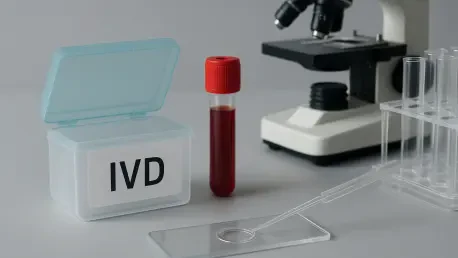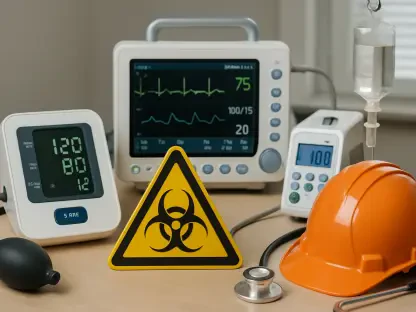In the rapidly evolving landscape of European healthcare, the shift toward personalized medicine has placed in-vitro diagnostics (IVD) at the forefront of innovation, with companion diagnostics (CDx) emerging as a critical tool in tailoring treatments for patients, especially in oncology. Amidst this transformation, Agilent Technologies has carved out a significant role by navigating the complexities of the European In-Vitro Diagnostic Regulation (IVDR) with strategic precision. The company’s focus on immunotherapy diagnostics, coupled with its ability to adapt to stringent regulatory changes, positions it as a frontrunner in a market poised for substantial growth. With an aging population and rising chronic disease prevalence driving demand for advanced diagnostics, Agilent’s proactive approach to compliance and innovation offers a compelling case study in market leadership. This article explores how the company is shaping the future of precision medicine in Europe through technological advancements and operational excellence.
Navigating Regulatory Challenges with Strategic Compliance
The transition from the older In-Vitro Diagnostic Directive (IVDD) to the more rigorous IVDR framework has reshaped the European diagnostics landscape, creating significant hurdles for many companies struggling to meet compliance deadlines. Agilent Technologies, however, stands out for its early and effective adaptation to these regulations. By securing IVDR certifications for key products like the PD-L1 IHC 28-8 pharmDx and PD-L1 IHC 22C3 assays, the company has not only ensured continuity of its offerings but also gained a competitive edge. This achievement is particularly notable in niche areas such as gastric and gastroesophageal junction (GEJ) adenocarcinoma, where Agilent holds a near-monopoly with the only IVDR-certified CDx for this condition in Europe. Such milestones reflect a deliberate strategy to prioritize regulatory alignment, enabling the company to maintain market access while many competitors face delays or product exits due to non-compliance.
Beyond certifications, Agilent’s regulatory success underscores a broader commitment to quality and patient safety, aligning with the IVDR’s emphasis on clinical evidence and post-market surveillance. This focus has allowed the company to build trust with healthcare providers and regulators alike, fostering a reputation for reliability in a sector where credibility is paramount. Additionally, the ability to navigate these complex requirements demonstrates operational agility, as resources have been allocated efficiently to meet stringent standards without compromising innovation. As the IVDR continues to challenge smaller firms or those with limited portfolios, Agilent’s proactive stance positions it to capitalize on market gaps, particularly in high-demand areas like oncology diagnostics. This strategic foresight ensures that the company remains a trusted partner in advancing personalized healthcare across Europe.
Capitalizing on Market Growth and Technological Trends
The European IVDR market is on a robust growth trajectory, with projections estimating the overall sector to reach USD 37.98 billion by 2030, growing at a compound annual growth rate (CAGR) of 5.5% from the current year onward. Within this, the companion diagnostics segment is expected to expand even faster, with a CAGR of 9.3%, reaching USD 4.44 billion by the same period. Factors driving this surge include demographic shifts such as an aging population, the increasing burden of chronic diseases, and a growing preference for point-of-care diagnostics. Agilent is well-positioned to benefit from these trends, particularly through its focus on molecular diagnostics and digital pathology. Key markets like Germany and the UK, with their strong healthcare infrastructure and research investments, provide fertile ground for the company’s expansion in precision medicine solutions tailored to immunotherapy.
Technological innovation further amplifies Agilent’s market relevance, as the integration of artificial intelligence (AI) and next-generation sequencing (NGS) into diagnostic platforms aligns with the industry’s shift toward data-driven healthcare. These advancements enable more accurate and timely identification of treatment pathways, especially in oncology, where personalized approaches are becoming the standard. By embedding such cutting-edge tools into its offerings, Agilent not only meets current market needs but also anticipates future demands, ensuring scalability and adaptability. The company’s emphasis on software and services as a revenue stream reflects an understanding of the growing role of digital solutions in diagnostics, positioning it to support healthcare systems transitioning to integrated, technology-enabled care models across Europe.
Financial Stability and Operational Efficiency as Competitive Advantages
Agilent’s financial resilience provides a solid foundation for its ambitions in the European IVDR market, as demonstrated by its reported revenue of $6.51 billion and a gross profit margin of 54% in recent financial statements. This profitability, maintained despite external pressures like currency fluctuations and biotech funding volatility, highlights a disciplined approach to resource management. Strategic cost-cutting initiatives, such as procurement optimization, have freed up capital for reinvestment into high-impact areas like companion diagnostics for immunotherapy. This financial discipline ensures that the company can sustain long-term growth while addressing the immediate challenges posed by regulatory transitions and market competition, reinforcing its standing as a reliable industry leader.
Operationally, Agilent’s efficiency extends to a diversified portfolio that spans reagents, instruments, and software, mitigating risks associated with reimbursement constraints or regional budget limitations in Europe. This broad product range allows the company to offer comprehensive solutions that appeal to varied healthcare needs, from clinical diagnostics to research applications. The fast-growing software and services segment, in particular, caters to the increasing adoption of data-driven diagnostic platforms, providing a scalable revenue stream. By balancing innovation with operational pragmatism, Agilent has created a robust framework to navigate industry-wide challenges like product exits and compliance bottlenecks, ensuring it remains agile and responsive to market dynamics while pushing the boundaries of precision oncology.
Shaping the Future of Personalized Medicine
Reflecting on Agilent Technologies’ journey, it’s evident that the company sets a high standard in the European IVDR market through a combination of regulatory foresight, technological innovation, and financial prudence. Its early compliance with IVDR standards paved the way for expanded treatment options in oncology, while strategic investments in AI and NGS signaled a commitment to redefining diagnostic precision. Looking ahead, stakeholders can anticipate Agilent continuing to drive advancements by focusing on scalable solutions that address reimbursement barriers and regional disparities in healthcare access. Collaborations with healthcare providers and investment in digital pathology could further enhance patient outcomes, while ongoing innovation promises to tackle emerging challenges in personalized medicine. As the market evolves, Agilent’s proven adaptability and comprehensive approach suggest it will remain a key influencer in shaping diagnostic standards across Europe.









